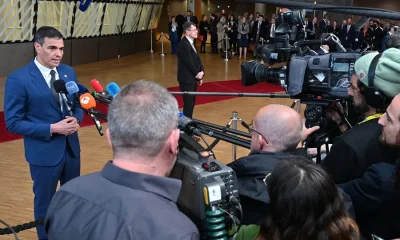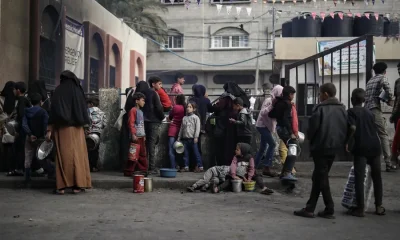International
Palestine’s path to full membership in the UN will be long

Palestine’s request to become the 194th State of the United Nations could follow the relatively rapid steps of other States that have joined the UN throughout the 21st century, but in its case it faces the probable veto of the United States in the Security Council.
The most recent State to take a seat at the UN as a full member was South Sudan, which in 2011 separated from Sudan after a friendly agreement. His incorporation into the UN was made by acclamation on July 14 of that year, just a week after his declaration of independence.
In 2006, Montenegro, another state that emerged from the dismemberment of the former Yugoslavia, separated after a popular referendum from the last remaining remnant of that federation and proclaimed its independence from Serbia. The referendum took place on June 3 and on the 28th of that same month the state was admitted to the UN.
And 2002 was a very special year because the UN welcomed two members: Switzerland did so in September, thus putting an end to an anomaly that made it welcome numerous international organizations but did not sit at the UN for the sake of a principle of neutrality inscribed in its DNA.
Much more traumatic was the chaos of Timor Leste, which was also admitted in September 2002. The new Asian country, a former Portuguese colony, lived 24 years of occupation and resistance against Indonesia and then almost three years of supervised administration of the UN, but its entry into the United Nations was unanimously approved by the Assembly.
In 2011, Palestine first presented its formal request to enter the United Nations, but the procedure ran aground in its first stage: it did not get the support of 9 of the 15 members of the Security Council (that is, the qualified majority), so that request did not reach the General Assembly, the second stage of the process.
Palestine had to settle for acquiring the status of “observer state,” an anomaly that only the Vatican has in the United Nations, which is not even considered a country with its own attributes.
Palestine obtained 138 votes in the General Assembly in favor of its new observer status, while 9 voted against (including Israel, the United States and Canada) and 41 abstained.
It is foreseeable that Palestine will not have it as easy as South Sudan, Montenegro or Switzerland had, and all observers assume that Washington will use the veto tool in the Security Council, which is the instance where the incorporation process begins and ends.
According to the UN letter, the request for a new State necessarily goes through the following stages: it is formulated before the Security Council, which appoints an ad hoc committee to study it formed by the fifteen members, and if the committee approves it, the Council then assesses whether it is “a peace-loving state” (article 60), in which case it sends the issue to the General Assembly.
In the Assembly, the votes of two-thirds of the Member States are needed to move forward, and if this happens, the final decision returns to the Security Council.
The United States, as a permanent member of the Security Council, has the right to veto the process at any time – in 2011 it threatened to do so, but did not need it – and few doubt that he will also use it on this occasion.
If this happens, the dream of Palestine will have fallen by the wayside.
But something has changed since 2011: now, every time a permanent member uses the right of veto, the question comes to the General Assembly, where that country must explain its position and submit to a non-binding vote.
At the current juncture, the United States will once again be evident in the face of a very large majority of states that are expected to support Palestinian membership.
International
Claudia Sheinbaum: Operation Against ‘El Mencho’ Was Based on Pending Arrest Warrants

Mexico’s President Claudia Sheinbaum on Wednesday rejected claims that the military operation that resulted in the death of Nemesio Oseguera Cervantes, known as “El Mencho,” leader of the Jalisco New Generation Cartel (CJNG), was carried out under pressure from the United States government.
Sheinbaum explained that the deployment of federal forces was aimed at executing outstanding arrest warrants against Oseguera Cervantes, who was considered one of the most wanted criminals in both Mexico and the United States.
“That was not the objective (to ease pressure from the United States). It is very important, and I want to repeat it. This individual had an arrest warrant, or several,” Sheinbaum said, referring to the operation conducted on February 22.
According to the president, the initial goal was to capture Oseguera Cervantes, but military forces responded after coming under attack during the intervention.
“The operation was to detain him. The problem is that they were attacked — the Secretariat of National Defense — and they responded at that moment,” she said.
The president insisted that the action was not carried out in response to external demands, although she acknowledged intelligence cooperation with the United States.
“It was not done in any way because of pressure from the United States, not at all. Of course, there was intelligence information from the United States that was used specifically,” she concluded.
International
Spain Denies Any Agreement to Cooperate with U.S. Military in Iran Operations
International
White House Says Spain Agrees to Cooperate with U.S. Military After Trump Threatens Trade Embargo

White House Press Secretary Karoline Leavitt said Wednesday that Spain has agreed “in recent hours” to cooperate with the U.S. military, following President Donald Trump’s threat to impose a trade embargo on Madrid.
Trump had warned of potential commercial measures after Spain reportedly refused to allow the Pentagon to use facilities at Spanish military bases for operations related to Iran.
“With respect to Spain, I think you heard the president’s message yesterday loud and clear, and I understand that in recent hours they have agreed to cooperate with the United States military,” Leavitt said during a press briefing.
She added that the U.S. military is currently coordinating with its counterparts in Spain. However, the president expects broader support.
“The president expects that all of Europe, all of our European allies, of course, will cooperate in this important mission — not only for the United States, but also for Europe,” Leavitt said.
Her remarks came in response to questions about Spain’s position and its role as a U.S. ally amid rising tensions surrounding operations involving Iran.
-

 International4 days ago
International4 days agoIran Reports 201 Dead, 747 Injured After U.S. and Israeli Strikes
-

 International3 days ago
International3 days agoBrazil’s Supreme Court Rejects Bolsonaro’s Bid for House Arrest
-

 International3 days ago
International3 days agoAnti-ICE Billboard Campaign Targets Immigration Spending in 31 U.S. Cities
-

 International4 days ago
International4 days agoPope Leo XIV Urges End to ‘Spiral of Violence’ in Middle East
-

 Sin categoría5 days ago
Sin categoría5 days agoTrump: ‘We Think It’s True’ Amid Claims Iran’s Supreme Leader Was Killed
-

 International2 days ago
International2 days agoSpain’s Prime Minister to Address Nation Amid Trump’s Trade Threats
-

 International5 days ago
International5 days agoSecurity Council to Hold Emergency Meeting on Middle East Crisis
-

 International3 days ago
International3 days agoTrump Warns of ‘Major Wave’ of Attacks as Iran Conflict Escalates
-

 International3 days ago
International3 days agoMexico Calls for Immediate Probe After National Dies in ICE Custody
-

 International2 days ago
International2 days agoNew York Announces First 2,000 Seats in Universal 2-K Program
-

 International19 hours ago
International19 hours agoWhite House Says Spain Agrees to Cooperate with U.S. Military After Trump Threatens Trade Embargo
-

 International19 hours ago
International19 hours agoSpain Denies Any Agreement to Cooperate with U.S. Military in Iran Operations
-

 Central America3 days ago
Central America3 days agoPanama Canal Monitoring Trade as Middle East Conflict Disrupts Shipping
-

 Central America19 hours ago
Central America19 hours agoNicaragua Held Responsible for Harassment of Opposition Prosecutor and His Family
-

 International3 days ago
International3 days agoBolivia Orders Three Investigations Into Deadly Military Plane Crash
-

 International2 days ago
International2 days agoWarner Bros. Developing First ‘Game of Thrones’ Movie With ‘Andor’ Writer
-

 Central America2 days ago
Central America2 days agoGuatemala’s Attorney General Fails in Bid for Top Court Seat Amid Corruption Allegations
-

 International19 hours ago
International19 hours agoClaudia Sheinbaum: Operation Against ‘El Mencho’ Was Based on Pending Arrest Warrants



































